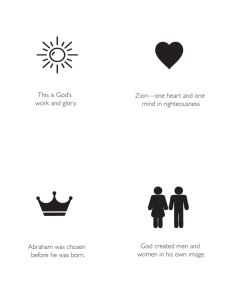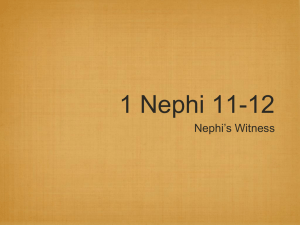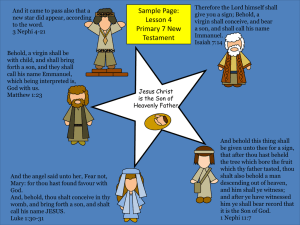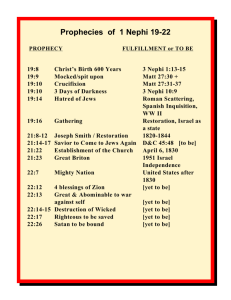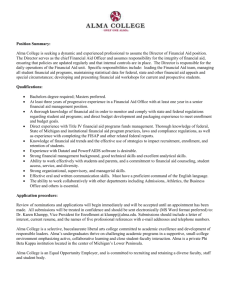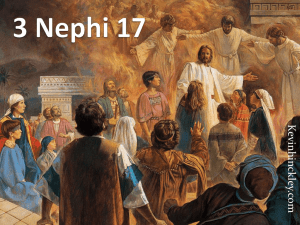The following is a compilation of the major types of poetic
advertisement
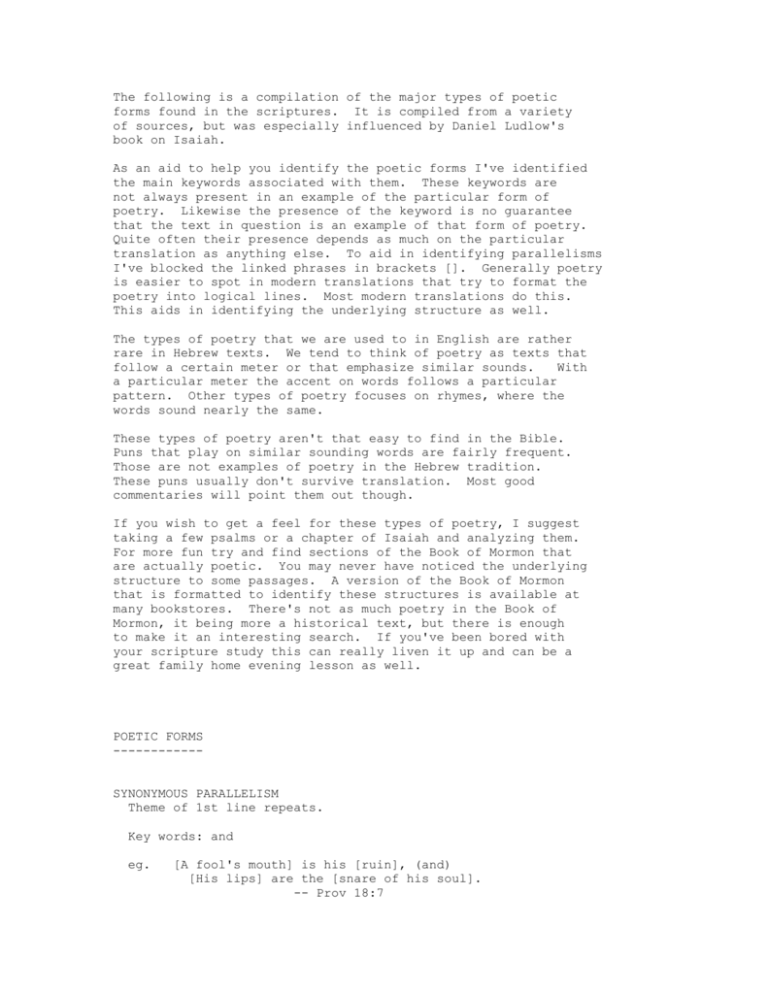
The following is a compilation of the major types of poetic forms found in the scriptures. It is compiled from a variety of sources, but was especially influenced by Daniel Ludlow's book on Isaiah. As an aid to help you identify the poetic forms I've identified the main keywords associated with them. These keywords are not always present in an example of the particular form of poetry. Likewise the presence of the keyword is no guarantee that the text in question is an example of that form of poetry. Quite often their presence depends as much on the particular translation as anything else. To aid in identifying parallelisms I've blocked the linked phrases in brackets []. Generally poetry is easier to spot in modern translations that try to format the poetry into logical lines. Most modern translations do this. This aids in identifying the underlying structure as well. The types of poetry that we are used to in English are rather rare in Hebrew texts. We tend to think of poetry as texts that follow a certain meter or that emphasize similar sounds. With a particular meter the accent on words follows a particular pattern. Other types of poetry focuses on rhymes, where the words sound nearly the same. These types of poetry aren't that easy to find in the Bible. Puns that play on similar sounding words are fairly frequent. Those are not examples of poetry in the Hebrew tradition. These puns usually don't survive translation. Most good commentaries will point them out though. If you wish to get a feel for these types of poetry, I suggest taking a few psalms or a chapter of Isaiah and analyzing them. For more fun try and find sections of the Book of Mormon that are actually poetic. You may never have noticed the underlying structure to some passages. A version of the Book of Mormon that is formatted to identify these structures is available at many bookstores. There's not as much poetry in the Book of Mormon, it being more a historical text, but there is enough to make it an interesting search. If you've been bored with your scripture study this can really liven it up and can be a great family home evening lesson as well. POETIC FORMS -----------SYNONYMOUS PARALLELISM Theme of 1st line repeats. Key words: and eg. [A fool's mouth] is his [ruin], (and) [His lips] are the [snare of his soul]. -- Prov 18:7 ANTITHETIC POETRY Thought of 2cd part contrasts opposite theme of 1st. opposition in all things. (2 Nephi 2:27) Shows Key words: but, though, if eg. When [pride] comes, then comes [disgrace] (But) with the [humble] is [wisdom]. -- Prov 11:2 EMBLEMATIC PARALLELISM Ideas of two lines are compared by a simile or metaphor. Keywords: like, as eg. (Like) [clouds and wind] [without rain] Is the [man] who boast of a [gift he does not give] -- Prov 25:14 SYNTHETIC PARALLELISM 2cd line completes or complements the thought of the 1st. Frequently the 2cd line answers or amplified the 1st line. The 1st line alone seems incomplete. Keywords: for,";",",",":" eg. Yea, though I walk through the valley of the shadow of death [I will fear no evil] (:) (For) thou art with me; [thy rod and staff comfort me] -- Psalms 23:4 COMPOSITE PARALLELISM Three or more phrases develop a theme by amplifying it. This generally occurs with a list. The Poet often has a memory aid of verb sequences. eg. nation, people, brood, children. Keywords: nor, a, any repeating phrase start eg. [Blessed] 1) Who 2) Who 3) Nor is the man /Main Theme/ [walks] not in the [counsel of the ungodly, [stands] in the [way of sinners], [sits] in the [seat of the scornful]. -- Psalms 1:1 CLIMATIC PARALLELISM A phrase form the 1st line is repeated until a theme culminated in an idea. Keywords: any repetition eg. (Your) [country] is [desolate] (Your) [cities] are [burned down] (Your) [land] is [devoured by strangers] before your eyes. -- Isaiah 1:7 The main theme is "it is desolate as overthrown by strangers." INTROVERTED PARALISM (CHIASMUS) A pattern is repeated in reverse order. The center "pivot point" generally expresses some key point or theme. The patterns form an x in the text. (See example and draw a line between matching phrases). The phrases may also be antithetical to each other. Keywords: any repetition eg. [We have escaped] as a bird from [the snare] of the fowlers. [The snare] is broken, and [we have escaped]. -- Psalms 124:7 Here is an example of using the poetic structure of a text to analyze it. Identifying the poetry emphasizes several meanings that Isaiah is attempting to communicate. While these meanings are apparent without being aware of the poetry, the poetry makes them much clearer. It also shows how complex and beautiful Isaiah's poetry is. Isaiah is very complex structurally and has significant structural forms on both the verse level all the way up to large structures spanning chapters. When you see how even the structure conveys the meaning it is very impressive. About the only text that comes close, in my mind, is Dante's poetry and how it fits his message that he is communicating. (The Divine Comedy is very complex structurally) The following is a very limited study of the first part of Isaiah. POETIC ANALYSIS OF ISAIAH CHAPTER ONE ------------------------------------1:4 Isaiah here intensely speaks of Israel's apostasy with several layers culimating into the the main theme of apostasy. Ah! | Sinful nation | People laden with wickedness, Parallelism | Evil Race | Corrup Children | Synonymous v ---- Nation People Race Family ___ from broad | Composite to | narrow range Subunit | | | | v __ They have [forsaken] [the Lord] | Climax | forsaken [Lord] | / \ ----| spurned Lord] | [spurned] [the Holy One of Israel] | Final Climax | Apostatized | 1:2-4 Verses 2-4 are completing a theme and are a form of composite parallelism 2a "Listen" Introduction: telling that the Lord is the speaker 2b [My children] have [left] children -> Israel 3 [Israel] [doesn't know me] 4a [Israel] [is wicked] 4b They have apostatized So the thought is conveyed of what constitutes apostasy: 1) leave the Lord ie. leave the covenant 2) don't understand ie. forget reasons for righteousness, lose spirit 3) become wicked 4) total apostasy Each point leads down to the next point. The steps are well shown by Isaiah. We may then can say that the reverse is true. 1) Join church 2) Repent 3) Know God 4) Fulfillment of Covenants, return to God 1:5-6 This has an example of climatic parallelism with a combined composite and complex synthetic parallelism. ___ (The whole) [head] is [sick] | Climatic (the whole) [heart is [faint] | __ Synthetic >From the sole of the foot to the head, there is no sound spot.| (but) wounds, | | (and) bruises | Composite | (and) putrifying sores: -| they have not been closed, -(neither) bound up | Synthetic (neither) mollified with ointment | -1:5-9 The whole completeness goes as follows 5a [You have been stricken], [why do you want more] coposite 5b-6 [You have been stricken], [you haven't repented] 7-9 [You will be stricken more] climatic or 1:7 A series of combined climatic paralells, with each phrase of the later two being an emblimatic parallel. ie. "like a hut in a vineyard" or "been as Sodom." The items go at first from the wide spread (country is wasted) down to the individual (your land is devoured) After the key line (duaghter has left) the reverse takes place, going from hut up to city. This isn't a chiasmus though as the items don't link up to one an other. The idea is conveyed in the poetry of the concept of "smallness" in what is left. This is then explicitely stated as "a small remnant." __ [Your country] [is a waste] | Climatic [your cities] [burnt with fire] | [your land] [devoured in front of you by strangers] | And the daughter of Zion is left \ -- / [like a hut] in a vineyard --| | [like a lodge] in a garden of cucumbers |climatic | [like a city] blockaded. | | --Except the Lord of Hosts had left Israel a small remnant We should have been as Sodom and | Climatic we should have been like unto Gomorrah | 1:10-15 10 Listen to the word of the Lord, wicked people 11a Why do you (sacrifice) -b I am full of (sacrifice) | Composite of c I find no pleasure in (sacrifice) | Meaningless Sacrifice 12 [When ye sacricice, who commands it?]*--13a Don't bring vain offerings | b Your incense is worthless | Composite of c Your meatings are wicked | Ordinances Wicked 14 Your festivals are destestable and weigh me down | 15 [All your acts are not recognized] * -ie. your ordinances aren't any good. Hopefully this gives a taste of how complex a literary document Isaiah is. The amaxing thing is how Isaiah's messages is so combined with his structure. It is almost impossible to separate one from the other without destroying the meaning of the text. ---------------------------Here are a few other literary forms that people might miss when they read the scriptures. These are taken from the Church's translation guide. I've left out the obvious ones like metaphor, allegory, and the like. Few of these are unique to the scriptures. though. Many are rather rare in modern English ACROSTIC A concealed message or word is encoded in letters from successive words and sentences eg. Iesous Christos, Theou Uios Soter --(Jesus Christ, Son of God, our Savior) Ichtus is Greek for fish. Other examples are recent arguments for "checksums" found in the Torah. There every 1000th character in the text spells out the name of a famous Biblical figure. Other periods spell out different names. This is considered controversal by some people in terms of signficant, but the examples are present. AMPLIFICATION Restating a phrase and adding additional details to avoid misunderstanding. This is frequently combined with parallelism (either antithetical or synonymous). eg. And thus we see that they buried their weapons of peace or they buried the weapons of war for peace. -- Alma 24:19 ANACOENOSIS Asking the opinion of the reader or hearer. Usually this is done to get them to condone the actions of the author. eg. And now, if I have no authority for these things, judge ye; for ye shall know that I have authority when ye shall see me, and we shall stand before God at the last day. -- Ether 5:6 What could have been done more to my vineyard, that I have not done in it? -- Isaiah 5:4 The Isaiah example is an especially good example as the question is being asked of the people being judged. Thus rhetorically the text functions in a manner akin to a real conversation. ANACOLUTHON An inadvertent or purposed break in the grammatical or poetic structure of a sentence. eg. And it came to pass that as he went forth among the people (Yea, among the people who has spearated themselves from the Nephites and called themselves Zoramites, being led by a man whose name was Zoram) [and as he went forth amongst them] behold he was run upon and trodden down, even until he was dead. -- Alma 30:59 Here we have the break, a partial restatement of the original sentence and then the conclusion. The way this ought to be written is as two separate sentences. The best example of this is D&C 84 where there are numerous examples of this. ANADIPLOSIS Repeating the same word or words at the end of one clause or sentence and at the beginning of the next. This is partially for emphasis and partially to make a connection. It is sometimes confused with synonymous parallelism or chiasmus. eg. Therefore, I command you to repent -- repent, lest I smite you by the rod of my mounth. -- D&C 19:15 ANAGOGE Assigning mystical or spiritual meaning to a word or passage in addition to the literal, allegorical and moral levels. eg. Zion, "more sure word of prophecy", Celestial ANAPHORA Repeating the same word or phrase at the beginning of several successive clauses. This is often found in composite or climatic parallelisms. When it isn't we call it this. <grin> eg. In In In In In my name they shall do many wonderful works; my name they shall cast out devils; my name they shall heal the sick; my name they shall open the eyes of the blind, my name they shall open the eyes of the blind and unstop the ears of the deaf. -- D&C 84:65-69 Thou also sayest, except we repent we shall perish How knowest thou the thought and intent of our hearts? How knowest thou that we have cause to repent? How knowest thou that we are not a righteous people? -- Alma 21:6 (This is also a climatic parallelism) ANAPODOTON Omitting the main clause from a conditional clause. eg. If thou wilt of thyself be destroyed, seek no more to destroy the church of God. -- Alma 36:9 ANTANAGOGE Making better a fault or difficulty by balancing the favorable aspect with the unfavorable one. eg. Behold, the Lamanites your brethren, whom of their filthiness and the cursing which their skins, are more righteous than you: not forgotten the commandment of the Lord unto our Father --- Jacob 3:5 ye hate because hath come upon for they have which was given ANTICATASTASIS Replacing the logical subject or object with an other noun that has a different relationship to the verb. eg. Therefore, you have delivered them up, yea, that which was sacred, unto wickedness. -- D&C 10:9 The noun wickedness replaces the expected noun "Oliver Cowdery." eg. Behold the wounds which pierced my side... -- D&C 6:37 APOSIOPESIS A sudden or deliberate silence in speaking. It is designed to emphasize that the thing unspoken is too woderful, solemn, sad or awful for words. eg. My soul is also sore vexed; but thou, O Lord, how long...? -- Psalm 6:3 APOSTROPHE An interruption in the text where the author turns away from one audience and starts talking to an other. Usually the new segment involves an impassioned plea. eg. When I remember these things, I pour out my soul in me: For I had gone with the multitude, I went with them to the house of God, with the voice of joy and praise, with a multitude that kept holy day. Why art thou cast down, Oh my soul? and why art thou disquieted in me? hope thou in God: for I shall yet praise him for the help of his countenance. O my God, my soul is cast down within me... -- Psalm 42:4-6 Initially the audience is the soul which then switches to God. APPOSITIONAL METAPHOR A type of implicit metaphor where the topic is put in apposition to the image noun. Thus the noun is tied to the topic. In English the word "of" usually separates the two. eg. the gall of bitterness a crown of glory a debt of gratitude the sword of justice ASYNDETON Giving a series of words or phrases without any conjunctions between them. The reader then has to hurry over the presented matters to reach the climatic summary statement at the end. This emphasizes the summary. eg. Galatians 5:22-23; Helaman 4:12; Mark 7:21-23; D&C 4:6-7 ATTIKI SYNTAXIS A form of Heterosis in which a noun or pronoun is contrued as both singular and plural. This generally is a shift from plural to singular as the focus shifts from individuals to the significant event. Moroni does this a lot. eg. And when you shall receive THESE THINGS, I would exhort you that ye would ask God, the Eternal Father, in the name of Christ, if these things are not true; and if ye shall ask with a sincere heart, with real intent, having faith in Christ, he will manifest the truth of IT unto you, by the power of the Holy Ghost. -- Moroni 10:4 also Moroni 7:38; 1 Nephi 10:19; Alma 42:21; Mosiah 2:41; Moroni 8:25 CATACHRESIS One word is change for an other that is only remotely connected to it. Sometimes it is an implicit metaphor or a weak one. eg. And his sword is bathed in heaven... -- D&C 1:13 The fruit of his loins... -- 2 Nephi 3:5 They were ripe in iniquity -- 1 Nephi 17:35 COENOTES The repetition of two different phrases: one at the beginning and the other at the end of successive sentences or paragraphs. eg. For behold it swelleth, and sproutheth, and beginneth to grow... And now, behold, will not this strengthen your faith? Yea, it will strengthn your faith for ye will say: I know that this is a good seed for behold, it sprouteth, and beginneth to grow, -- Alma 32:30 Also 2 Nephi 29:12 COGNATE ACCUSATIVE A verb and it's object are derived from the same word I will also command the clouds that they rain no rain upon it. -- 2 Nephi 15:6 Judge righteous judgement. -- John 7:24 CYCLOIDES Repeating the same phrase at regular intervals. Sometimes the period or frequency of the intervals is significant. For instance in Day of Atonement sermons the name of the Lord is quoted 7 or 10 times. (Perfect numbers in Hebrew) If it is repeated at irregular intervals it is an Epibole. eg. Ezekiel 32:20-32 "slain with the sword" 12 times 3 Nephi 9 "hide their wickeness and abominations from before my face" repeated 5 times. DIRECT CORRESPONDENCE This is the same as a chiasmus except that instead of repeating the subjects in reverse order they are repeated in the same order. ie. A -> B -> C A -> B -> C while in Chiasmus A -> B -> C C -> B -> A eg. Psalm 132 among many other examples. Frequently Direct Correspondences are combined with Chiasms. In these cases the subjects may be repeated in one order and then an other as the subjects are emphasized again and again. DYSPHEMISM The opposite of a euphemism. The use of disparaging or offensive term to describe something inoffensive or significant. eg. I...will cut off from Jeroboam him that pisseth against the wall. -- 1 Kings 14:10 EISEGESIS Interpreting a text by reading one's own ideas into it. This is usually a popular yet erroneous interpretation of a text, frequently due to ambiguity in translation. eg. For mine house shall be called a house of prayer for all people -- Isaiah 56:7 ...my house shall be called a house of prayer -- Matt 21:13 And the prudence of the prudent will I reject -- Is 29:14 And the prudence of the prudent I will hide -- 1 Cor 1:19 eg. 1 Thess 5:22 "abstain from all appearance of evil" means all types of evil. Because of the KJV translation it has come to mean even things that others may interpret as evil. ELLIPSIS The omission of words that are needed to complete a sentence but are understood by the reader even when missing. eg. And they shall give heed unto these words and trifle not, and I will bless them. (Trifle not WITH THEM) -- D&C 32:5 Our first parents...could have partaken of the tree of life. -- Alma 12:26 (partaken of THE FRUIT) ENIGMA A phrase expressed in intentionally obscure or puzzling language eg. "the abomination that maketh desolate" -- Daniel 11:31; 12:14 Destroy this temple and in three days I will raise it up. -- John 12:19 EPANADIPLOSIS Repeating the same word or phrase at the beginning and end of a sentence. eg. Christ, I have been crucified together with, yet I live yet it is no longer I that live, but in me Christ. -- Gal 2:20 EPANALEPSIS The repetition of the same word or phrase after a break, digression or parenthetical comment. It is a clue that the original structure, grammar, or theme is being returned to. eg. Moses 6:5 has the phrase "And a book of remembrance was kept" followed by a digression. When it is returned to a very similar phrase is repeated, "an a genealogy was kept..." also Alma 30:59; D&C 84:63-64 EPANODOS A short chiasmus. Two words or prhases are repeted in reverse order although they mean the same thing. EPIBOLE The same as an cycloid but repeated at irregular intervales. eg. Jacob's speech in 2 Nephi 8-11 repeats Lord or Lord God 7 or 10 times. This was frequently done on various Jewish Holy Days. 7 & 10 are "perfect" numbers in Hebrew. also Isaiah 5 - "and his anger is not turned away, but his hand is outstreched still." EPOSTROPHE The repetition of the same word or phrase at the end of successive sentences. eg. Are they Hebrew? So am I. Are they Israelites? So am I. Are they the seed of Abraham? So am I. -- 2 Cor 11:22 also 2 Nephi 26:25-28; Psalms 115:9-11 EPIZEUXIS The rhetorical repetition of one or several words in succession. This was frequently used in the Bible to represent the concept "most." Jerusalem, Jerusalem, thou that killeth the prophets... -- Matt 23:37 ...four beasts...saying "Holy, holy, holy, Lord God Almighty..." -- Rev 4:8 EROTESIS A question asked for effect and not because the speaker does not know the answer. eg. Are we not all beggars? -- Mosiah 4:19 O be wise; what can I say more? -- Jacob 6:12 EUPHEMISM The use of a mild term for an offensive one. eg. Surely he covereth his feet in his summer chamber. -- Judges 3:24 (for using the bathroom) ...that not one of them is left to stand by the wall. -- D&C 121:15 quoting 1 Kings 16:11 EXERGASIA The repetition of a number of resemblances in close succession. This is basically a parallelism without the strict structure. eg. Who is she that looketh forth as the morning, fair as the moon, clear as the sun, and terrible as an army with banners? -- Song of Solomon 6:10 HENDIADYS Stating as two coordinated things when they are really the same thing. eg. I will greatly multiply thy sorrow and thy conception. -- Genesis 3:16 ...to be judged at the last and judgment day. -- Alma 33:22 HETEROSIS Exchanging one voice, mood, tense, person, number, degree, or gender for an otther. (See also Attiki Syntaxis) eg. Alma 41:14 Alma switches from thee to ye in talking to Corianton. And because man became fallen they were cut off from the presence of the Lord. -- 2 Nephi 9:6 (this is likely a Hebrewism though) HOMOGENE A form of Polyptoton in which a verb and its participle are used together. The meaning of the verb is emphasized These often don't survive translation. eg. thou shalt surely die. -- Gen 2:17 I will greatly multiply -- Gen 3:16 thou mayest freely eat -- Gen 2:16 (lit: dying thou shalt die) (lit: multiplying I will multiply) (lit: eating thou shalt eat) HYPALLAGE Interchanging elements of a construction so that the main word modifies the word that should modify it. eg. She hid them with the flax of stalks. -- Joshua 2:6 (stalks of flax) Who shall deliver me from the body of this death? mortal body) -- Rom 7:24 (this HYPOCATASTASIS A metaphor without the topic and point of similarity. metaphor that is incomplete. eg. Basically a Beware the leaven of the Pharisees and of the Sadducees. -- Matt 16:6 Come forth and bring fruit unto repentance. -- Alma 34:30 HYPOPHORA Posing questions and answering them. A catechism. eg. D&C 77 INTERSPERSION Repeating a complete description in fragments between which are interspersed fragments of a second description. To fully understand the message the reader must reconstruct the coded message. Usually this is done to keep the message from the ridicule or knowledge of the uninitiated. eg. Revelations 2-3 contains both a description of the Lord and a description of the endowment. The key is the description of the Lord in chapter 1. The phrase "he who has ears" is in some verses as an aid. METALEPSIS A compound metonymy where one thing is mentioned in place of an other which is used to represent a third thing. eg. But wo unto such, for their reward lurketh beneath, and not from above. -- D&C 58:33 METANIA A statement immediately correct by substituting something better. eg. These six things doth the Lord hate: yea, seven are an abomination unto him... -- Proverbs 6:16 also Alma 24:6, 1 Nephi 19:7, Alma 10:5 METASTASIS Passing over an issue quickly eg. Now I need not rehearse the matter; what I have said may suffice. -- Alma 13:20 And now I, Nephi, do not speak all the words of my father. But to be short in writing, behold he saw... -- 1 Nephi 8:29-30 METONYMY Substituting a noun wiht an attribute of the original noun. eg. "the prophets" for "the writings of the prophets" -- 2 Nephi 25:28 ...then ye shall be smitten...by the sword. -- Alma 10:23 PARELCON Using two or more words where only one was needed. eg. ...and did witness of it. -- 3 Nephi 10:1 ("of it" for "it") ...all that thou settest thine hand unto for to do. ("unto for to" for "to") -- Deut 38:20 PARENTHESIS An explanation inserted into a sentence or paragraph that is an interruption of the main idea or structure. In English we usually mark this in parenthesis (). eg. And this Anti-Christ whose name was Korihor, (and the law could have no hold upon him) began to preach unto the people that there should be no Christ. -- Alma 30:12 PARONOMASIA Using words in a sentence that are similar in sound but not meaning. These are often used in puns. eg. God is able of these stones (abanim) to raise up children (banim) unto Abraham. -- Matthew 3:9 And the priest shall have in his hand the bitter (hammarim) water that causeth the curse (hamarrim). -- Numbers 5:18 PARTITIVE GENITIVE A form of Polyptoton in which a singular noun is followed by it's own plural in the genitive case. It is the equivalent of the superlative degree of comparison. eg. Holy of holies -- most holy place King of Kings -- greatest king Song of Songs -- greatest song Day of Days -- greatest day POLYSYNDETON The repetition of the word "and" at the beginning of successive words or phrases. It make the reader slow down and consider each phrase. eg. Helaman 3:14; Joshua 7:24; etc. SEMIDUPLEX ORATIO A type of parallelism where words omitted in the first clause are supplied in the second while words supplied in the first clause are omitted in the second. eg. A wise son maketh a glad father but a foolish son is the heaviness of his mother. -- Prov 10:1 (A wise son makes a mother glad too, and a foolish son makes his father sad) For the Lord knoweth the way of the righteous; but the way of the ungodly shall perish. -- Psalm 1:6 Without beginning of days or end of years. -- D&C 84:17 SYMPLOCE The repetition of two different words or phrases in successive sentences. Basically a complex form of a Coenote. It is sown in corruption; It is raised in incorruption. It is sown in dishonor; It is raised in glory. It is sown in weakness; It is raised in power. It is sown a natural body; It is raised a spiritual body. -- 1 Cor 15:42-44 SYNECDOCHE A type of metonymy where a part is substituted for the whole. eg. ...upon their heads -- Enos 1:10 ...both limb and joint shall be restored to its proper frame. -- Alma 11:43 TETRADS Joining four items. Usually this is so that adjacent items share in an alliteration or same sound. eg. heart, might, mind, and strength -- D&C 4:2 every nation, kindred, tongue and people. -- Rev 14:6 TRIAD Joining three items that often share a rhyme, sound, or alliteration. eg. ...carnal, sensual, and devilish... -- Alma 42:10 /// Clark Goble //// cgoble@fiber.net ///
